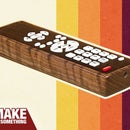Introduction: Bandsaw Box With Pencil Holder
Bandsaw boxes are the items that really got me hooked on woodworking. I even wrote a how-to book on making them! This bandsaw box comes directly from that book.
Step 1: Get Off to a New Start
Unlike the other boxes, this one requires you to cut out the pencil holder area before the initial glue up. You’ll need to start with a piece that’s at least 6" x 5" and at least 1 1/2" thick. I’m using 2" thick walnut.
Step 2: Build Your Box Blank
Lay on the glue and clamp up the two bamboo faces to the walnut core.
Step 3: Apply the Template.
Draw up your box in. your favorite vector program. I used Adobe Illustrator. Print it out and use spray adhesive to apply it to your blank.
Step 4: Cut the Box to Shape
When the glue dries bandsaw the outer shape, staying close to the line but without cutting into it. In a later step you’ll sand down to the line.
Step 5: Cut Out the Drawer
Unlike the other boxes in this book the drawer will open from both sides. Start by cutting the shape of the drawer by following the grain and entering from the nearest side.
Step 6: The Box Is Shaping Up
Here’s what your box should look like with the drawer cut out.
Step 7: Cut Up the Drawer
Remove the front and back of the drawer at the bandsaw. Because the drawer has no flat bottom it’s safer and easier to use a handclamp to aid the cutting process.
Step 8: Separate the Drawer Parts
After completing both cuts on the drawer you can separate the front and back and focus on the center section.
Step 9: Mark the Drawer Opening
Draw out the waste area on the center of the drawer. Drawing it out freehand is fine—just aim for sides about 3/8" thick.
Step 10: Cut the Drawer Sides
Head back to the bandsaw to remove the waste area of the drawer.
Step 11: Rebuild the Drawer
Use yellow glue and plenty of clamps to re-attach the front and back of the drawer to the center section.
Step 12: Close Up the Box
Add a bead of glue to the kerf left from when you started cutting out the drawer. Then clamp it closed with a clamp or two.
Step 13: Sand to the Line
Once the glue dries, take the outer shell to the disc sander and sand down to the line. The same thing can be done manually using a sheet of sandpaper set flat on your bench.
Step 14: Shape the Drawer
Template lines on the drawer may not be visible. To make sure the drawer doesn’t fit too loose, just sand it smooth without removing too much material.
Step 15: Round the Edges
Using a 1/8" round over bit mounted in your router table, smooth the edges of the shell and drawer. If you don’t have a router table, this can be done using sandpaper or a rasp.
Step 16: Give It a Final Sand
For a smooth box that invites touch and feels good to your hands, progress sand through sandpaper grits to 320.
Step 17: Apply the Finish
Only the shell and drawer need to be finished. The inside of the drawer and shell are flocked instead.
Step 18: Drill for the Pulls
You can make your own drawer pulls if you prefer, but I found drawer pulls at my local hardware store. They mount easily through a hole drilled in the drawer fronts.
Step 19: Mount the Pulls
For simple store bought pulls like the one seen here, just add a thin layer of epoxy to the pull and slide it in place.
Step 20:
That's it!! Be sure to watch the video tutorial on YouTube for added tips and if you're looking for the book you can get it here.

Participated in the
Wood Contest 2016













